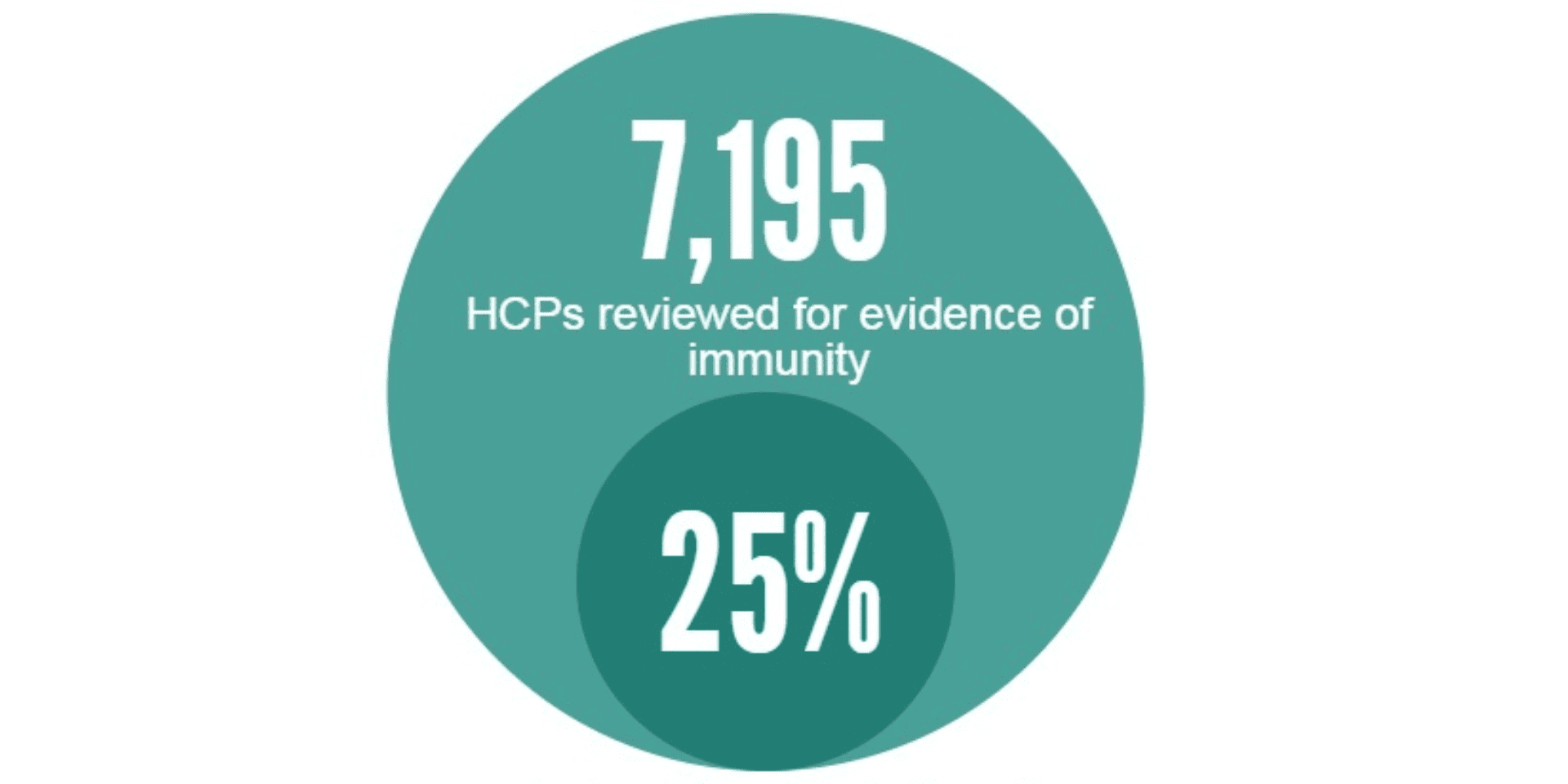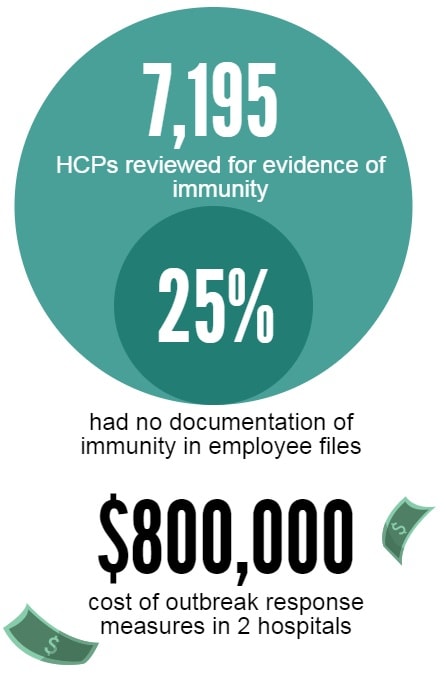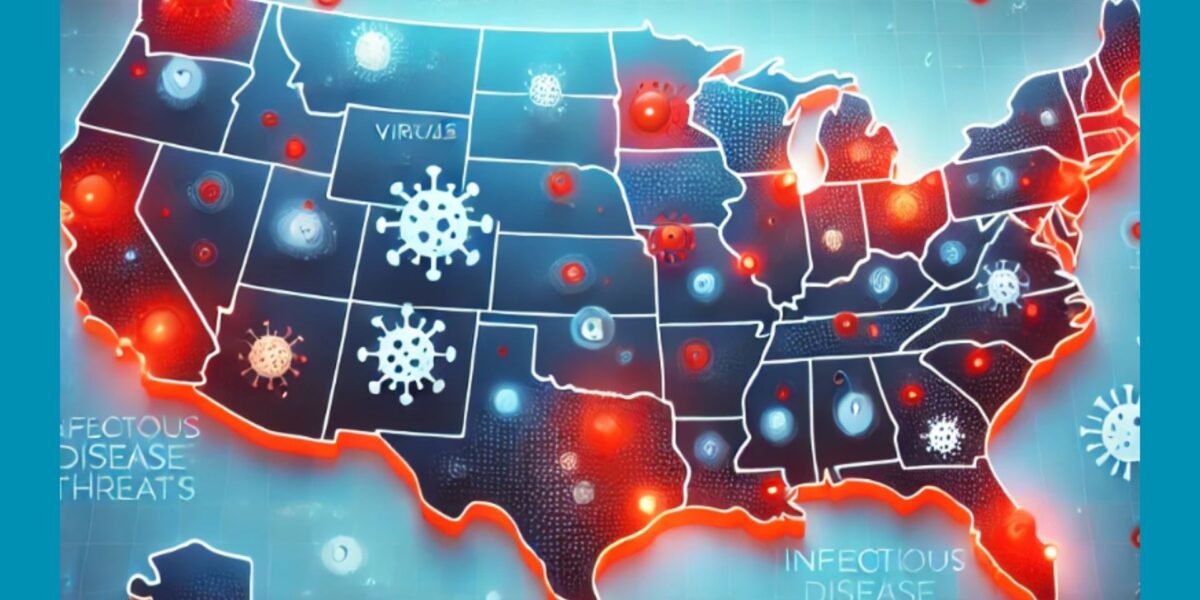
During a recent NFID webinar, Vaccination for Healthcare Professionals, discussions among the more than 500 participants centered around the importance of immunizing healthcare professionals (HCPs) who are at risk for exposure to serious, and sometimes deadly, diseases. HCPs also risk transmission to the patients they care for, their families, and colleagues. In addition to the impact on public health, outbreaks can also be costly and disruptive.
 For example, during a measles outbreak in Arizona, half of the cases were acquired in healthcare settings, more than 7,000 HCPs were reviewed for evidence of immunity during the outbreak, and 25% were found to have no documentation of immunity in their employee charts. This prompted outbreak response measures at an estimated cost of $800,000, primarily to cover vaccination and furloughs related to lack of readily available records on evidence of immunity.
For example, during a measles outbreak in Arizona, half of the cases were acquired in healthcare settings, more than 7,000 HCPs were reviewed for evidence of immunity during the outbreak, and 25% were found to have no documentation of immunity in their employee charts. This prompted outbreak response measures at an estimated cost of $800,000, primarily to cover vaccination and furloughs related to lack of readily available records on evidence of immunity.
The Advisory Committee on Immunization Practices (ACIP) recommends that all HCPs receive hepatitis B, influenza, Tdap, MMR, and varicella vaccinations, to reduce the chances of contracting or spreading vaccine-preventable diseases.
Only 77% of HCPs (including medical and nonmedical staff) reported getting an influenza (flu) vaccine during the 2014-15 season, well below the Healthy People 2020 goal of 90%
While there are currently few federal or state requirements, vaccination mandates are one strategy to increase flu vaccination rates among HCPs. In fact, during the 2015-15 flu season, coverage reported was highest among HCPs who were required by their employer to be vaccinated as well as those working in settings where vaccination was offered on-site at no cost. Research has also shown that effective communication about the risks of influenza and benefits of vaccination can positively influence receipt of vaccination. The Situation, Background, Assessment, and Recommendation (SBAR) technique has become industry best practice for standardized communication in healthcare and can be very effecctive in framing a dialogue with HCPs about influenza vaccination:
- Situation: Influenza is a dangerous disease and vaccination is our best tool to prevent it.
- Background: You can spread the flu to others even before you have any symptoms. Getting the flu may mean being out of work for a week or more. The flu vaccine does not cause flu. As HCPs, we can transmit flu to our patients who can die.
- Assessment: Flu is a vaccine-preventable disease that can be severe for your patients, yourself, and your family. Flu vaccines are safe and effective.
- Recommendation: Get an annual flu vaccine before flu season begins and strongly encourage everyone 6 months of age and older to get vaccinated.
To learn more about current recommendations and strategies to increase HCP vaccination rates…
- Attend the Spring 2016 Clinical Vaccinology Course (March 18-20, 2016 in Phoenix, AZ)
- View the archived NFID webinar: Vaccination for Healthcare Professionals
- Read and share previous NFID News blog post: Protecting Those Who Protect
- Download Immunization Resources for the Workplace
To join the conversation, follow us on Twitter (@nfidvaccines), like us on Facebook, join the NFID Linkedin Group, and subscribe to NFID Updates.
Related Posts

News Round-Up: Infectious Disease Threats
According to NFID website poll, there are several worrisome infectious disease threats. Read recent news on topics of greatest concern, including avian influenza (bird flu), measles, and respiratory syncytial virus (RSV) …

Vaccines and Heart Health: A Vital Connection
Heart disease can increase the risk of serious or fatal complications from respiratory diseases including COVID-19, flu, and RSV

Harnessing the Power of Local Data
NFID dashboard aims to empower stakeholders with hyperlocal data to increase US adult respiratory vaccine uptake

